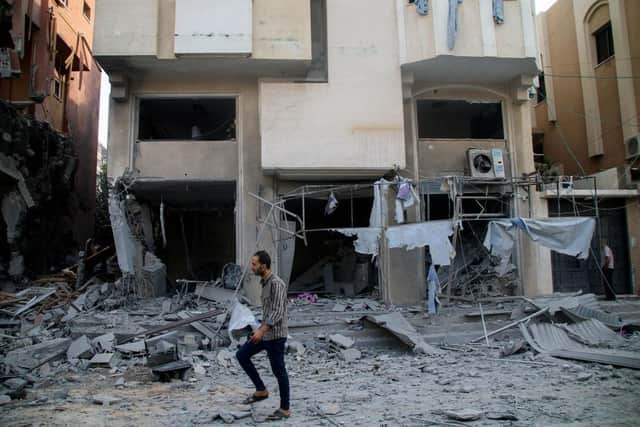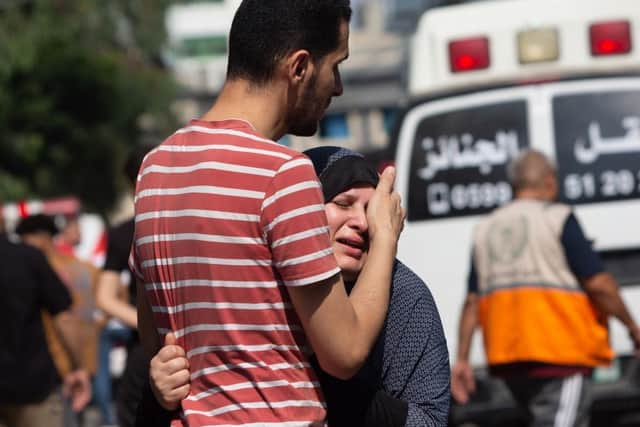Gaza's only power plant runs out of fuel amid Israeli bombardment
The humanitarian crisis in Gaza is deepening, authorities have warned, as the territory’s only power plant ran out of fuel, cutting off mains electricity and plunging it into darkness.
Gaza’s authorities said the failure of the Gaza power plant made it impossible to provide “all basic life services” as the death toll in Gaza since the conflict began on Saturday topped 1,000.
Advertisement
Hide AdAdvertisement
Hide AdIsrael has carried out a sustained bombardment of Gaza since Saturday’s attacks on its soil by Hamas and has put the territory under siege, with no power, food or medical supplies able to be brought in across the Israeli border. A ground assault is expected to be imminent after 300,000 reservist soldiers were amassed at Israel’s border with Gaza on Wednesday.


Fuel supplies keeping power generators going in Gaza’s hospitals are also expected to run out by Thursday.
Aid agencies warned that many of their staff working on the ground have, themselves, become refugees, after their homes were damaged or destroyed.
Medical facilities have been overwhelmed by thousands of injured people. Meanwhile, many families are sheltering at hospitals as as a perceived safe place from air strikes. Others have taken shelter in schools, where they are being supported by aid organisations including the United Nations Relief and Works Agency for Palestine Refugees (UNRWA).
The International Committee of the Red Cross in Israel and Occupied Territories (ICRC) said four medics working to help injured civilians in Gaza had been killed by “live ammunition”.


Referring to the closure of Gaza’s only border with a country other than Israel – the Rafah crossing into Egypt, the statement issued by Gaza’s authorities on Wednesday said: “This threatens to plunge the strip into complete darkness and make it impossible to continue providing all basic life services, all of which depend on electricity, and it will not be possible to operate them partially with generators in light of the prevention of fuel supplies from Rafah Gate.
“This catastrophic situation creates a humanitarian crisis for all residents of the Gaza Strip.”
The statement also referred to Israel’s retaliation strikes “as the dirtiest crime of collective punishment against defenceless civilians in modern history” and called on the international community to move quickly to stop “this crime against humanity and this multi-form mass murder”.
Advertisement
Hide AdAdvertisement
Hide AdInternational organisations including The World Health Organisation (WHO), have called for a humanitarian corridor to be opened to allow essential aid and supplies into Gaza, while UN human rights chief Volker Turk has warned the siege and air raids which have hit civilian targets including residential buildings, schools and United Nations buildings were potentially in breach of international humanitarian law.
The ICRC condemned the attacks which killed medics working for the Palestine Red Crescent Society.
It said: “Today we received news that PRCS medics were killed with live ammunition while performing their life-saving work. This is unacceptable. We offer our sincere condolences to staff and their loved ones. We condemn all attacks on healthcare workers and first responders.”
The PRCS said medical workers Khalil Al-Sharif, Yusri Al-Masri, Ahmad Dahman and Hatem Awad were killed in what it described as “directly targeted” hits on two ambulances by Israel.
UNRWA said on Wednesday that it has less than two weeks’ supply of food and water to assist the more than 180,000 people – of the 264,000 total who have been forced to leave their homes - who have sought refuge in its 88 schools in Gaza.
More than 60 per cent of people in Gaza were already classed as living in poverty, with 1.2 million people in the territory already relying on food assistance from the UNRWA.
“We’ve got supplies for 12 days for food and water. Roads are blocked, we don’t have telephone lines, we have had networks hit by air strikes. It is really difficult for us to know what’s happening,” Jennifer Austin, deputy director of the agency, said.
“We are relying on our staff, who are themselves refugees, who are going out to provide a service. It is really unprecedented situation we are facing.”
Advertisement
Hide AdAdvertisement
Hide AdMatthias Kannes, the Head of Mission for Medecins Sans Frontieres in Gaza, said: "Many of our Palestinian colleagues left their house out of fear of being targeted. Many of them reported complete destruction of the building they were living in."
Action Against Hunger, which has been operating in Gaza in 2005, said it had been forced to suspend its operations.
“It is vital that both sides of the conflict prioritise civilian protection, facilitate access to essential humanitarian aid and allow for the opening of humanitarian corridors,” said Chiara Saccardi, Action Against Hunger's Middle East Officer.
Gaza, which already struggled with water supplies due to the ongoing hostilities with Israel, now has a severe crisis.
The UN has said that damage to five water, sanitation and hygiene facilities from Israeli air strikes has undermined the provision of services to over 500,000 people, while it added that in parts of northern Gaza, "sewage and solid waste are accumulating in the streets due to damage to sewage lines and infrastructure".
On Tuesday, Israeli Prime Minister Benjamin Netanyahu vowed “this is only the beginning” of retaliation against Hamas.
It said on Wednesday that it had hit 400 targets in 24 hours. Among other targets, fighter jets attacked the Islamic University, which serves as an important centre of political and military power for the terrorist organisation Hamas in the Gaza Strip and a training institution for the development and production of weapons.
Egypian diplomat Sameh Shoukry has held talks with UNWRA about how to help civilians in Gaza, with which it shares a border. The Rafah border, controlled by Egypt, was closed on Tuesday following Israeli air strikes.
Mr Shoukry warned of the "dangerous humanitarian situation in the Gaza Strip" and said Egypt "fully supports UN agencies" in ensuring the delivery of humanitarian aid.
Comments
Want to join the conversation? Please or to comment on this article.
